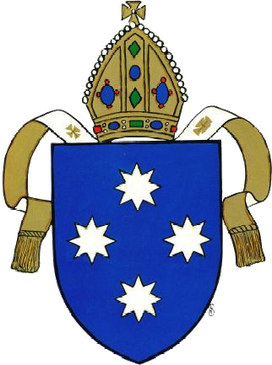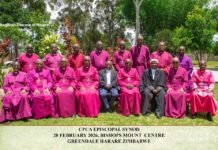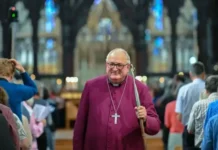Anglican school council members, school principals and board members of diocesan organisations will NOT have to sign up for a Sydney Anglican statement of marriage after a vote by their synod (church parliament) on Monday.
The Executives and board members of Anglican schools and organisations in Sydney will not have to sign a proposed statement: “I also believe that this faith produces obedience in accordance with God’s word, including sexual faithfulness in marriage between a man and a woman, and abstinence in all other circumstances.”
The word “also” is used as this paragraph has been added to a more general statement of faith also passed by the synod. The motion was defeated 114 to 272 in the House of Laity.
The debate was about whether board members of Anglican organisations should be forced to make a personal public stand opposing same-sex marriage – in effect, who should be in the front line in a culture war issue. The alternative and successful view was to have the organisation rather than the individuals take the stand. Nobody speaking in the debate in the conservative evangelical diocese argued in favour of same-sex marriage. Some diocesan bodies may have a policy to have board members or their CEO sign a similar statement.
(Following the defeat, which was announced on Tuesday afternoon , the mover of the motion, Dean Sandy Grant asked the synod to affirm that the diocesan marriage doctrine had not changed – that “marriage is the exclusive union of one man and one woman.” Speakers in favour said they wanted to make sure no-one would think the Sydney Synod had changed its mind on marriage.
Sandy Grant’s motion was overwhelmingly carried on the voices.)
“Like many of you I have a close family member who has married a same-sex partner,” Sandy Grant, Dean of St Andrews Cathedral, said as he began his speech proposing the original motion to have board members sign the statement “I love my relative deeply. That relative also loves me. And we carry the debate in that spirit.”
However, he quoted former Archbishop Peter Jensen: “Human anthropology is the watershed issue in our society,” and detailed how the statement continues policy previously supported by the synod. He traced how church history had focussed on different controversies, such as Christology in the third century and sacraments in the fourth. Marriage and sexuality were the issues for our age.
“Marriage is never peripheral,” Grant said. “Family is the foundational pre-political basis od society. It is central to New Testament ethics. Our 2014 Doctrianl Commission reprt affirms the importance of marriage. Gafcon included marriage as one of the tenets of orthodoxy.”
Michael Jensen, senior minister of Darling Point (and Peter Jensen’s son), urged synod members to vote “no,” describing the statement as ineffective and counterproductive.
In common with other speakers against the motion, he outlined his personal conservative opinion on marriage but argued the statement was provocative. “I have been towelled up by Karl Stefanovic and ridiculed on Q and A, but this is not the place to make that stand.” Jensen said. Arguing that the new requirement for the personal statement was unnecessary, he added, “We put in $1m [during the marriage postal survey] to make the point. It’s what we are known for.”
Addressing the Synod, mostly made up of church representatives and senior ministers, Jensen said, “We are asking others to make our stand … it is like World War One, sending men needlessly over the top. We should not ask our schools to make themselves a target of protest.”
Andrew Bruce, senior Minister at St Peters, Cooks River, speaking for the motion, said, “No one likes to have this conversation. But it can be done – for want of a better word – well. Let me assure you that a statement of faith is a necessary tool. This is a point where we need to be clear about what the Christian faith is about.”
Speaking for all the Heads of Anglican Schools, Naomi Wilkins, Principal of Oran Park Anglican College, spoke of unintended negative consequences if the statement was instituted. “I have led a Anglican school for eight years committed to a faithful proclamation of the gospel.” She described the heads’ opposition as “Not shirking, but to make sure we can carry out our mission.” Making the schools’ leaders sign on to an earlier version of the statement “has led to us being regarded as judgemental and exclusionary. It sows seeds of distrust rather than faith and understanding.”
Surry Hills Senior Minister Toby Neal described a newspaper announcing his church as “anti-gay” but described how his church is opened up on Mardi Gras night each year. “You can both show hospitality and not be ashamed of what Jesus said … If those who lead our schools are ashamed to sign this, then I have no hope of what they will teach.
“I hear ‘why is this the only thing you talk about?’” said Andrew Errington, Senior Minister of the Newtown Erskinville Parish. “I believe we have been forced to [talk about this] by a wayward world. But if this is the only thing we are specific about no one will believe it is not the only issue we care about. We are not actually obsessed with homosexuality. We should not let reactivity to the world shape our response.”
Michael Jensen, in a right of reply, pointed out that all the speakers for the motion were parish clergy, not affected in the same way as other speakers on the other side.
Earlier on Monday evening, the Synod had passed a more general statement of faith that Anglican Board Members, School Principals and others will need to sign.
It reads “1. I believe –
(a) that all the canonical scriptures of the books of the Old and New Testaments are the ultimate rule and standard of faith given by inspiration of God and contain all things necessary to salvation,
(b) in the Christian faith as professed by the church of Christ from primitive times, and in particular as set forth in the creeds known as the Nicene Creed and the Apostles’ Creed, and
(c) that there is only one way to be reconciled to God, which is through his Son, Jesus Christ, who died for our sins and was raised for our justification, and that we are justified before God by faith only.
2. I also believe that all the canonical scriptures of the Old and New Testaments are the supreme authority in all matters of faith and conduct and am personally committed to living in obedience to the commands of Christ.”
The motion for the more general statement of faith passed 256 for, 140 against, in the House of Laity, 157 for, 79 against, in the House of Clergy.
Speaking against making all board members sign it, Andrew Katay, senior minister at Christ Church Inner West, pointed out that of the 674 governors (board members and others) affected, 653 were diocesan appointments.
A motion to have the alumni association members of school boards sign the general statement of Christian faith was moved on Tuesday by Dr Laurie Scandrett citing 2 Corinthians 6:14 “Be not unequally yoked with unbelievers.” 21 members of the boards of older schools are involved. The King’s School and Shore have 29 per cent Alumni representation.
Tim Bowden, the head of Trinity Grammar, spoke against the motion. “Seven schools and 21 people. Why are we having this debate? We are worried about mission drift.” He listed safeguards – such as a substantial majority of diocesan appointees of at least 2 to 1 on the school boards. He pointed to the requirement of “organisational faithfulness.” “This extra safeguard adds very little and it costs a lot” said Bowden, discussing the impact on personal relationships.
The motion was lost in the House of Laity, 178 for, 195 against.
Note: I have put the part about Sandy Grant’s second motion to affirm the synod’s view on marriage, which he moved after the motion requiring board members to sign a marriage statement was defeated in parentheses. I have used this device is to seperate the two motions in response to reader feedback.



